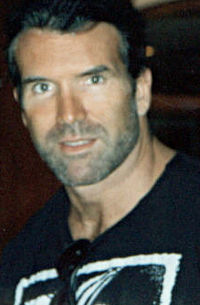 Anyone who follows the wrestling industry didn’t need to see an ESPN documentary to know that Scott Hall is in trouble. Every book ever written about WCW describes his plight from one of the industry’s hottest commodities to a drunk all out of chances.
Anyone who follows the wrestling industry didn’t need to see an ESPN documentary to know that Scott Hall is in trouble. Every book ever written about WCW describes his plight from one of the industry’s hottest commodities to a drunk all out of chances.
Ten years later, it’s obvious things are much worse.
While the documentary made for great viewing and will open up eyes to people not familiar with the sport, it continues to prove that wrestlers need some kind of support system when their careers are over. A real one. Stephanie McMahon stated during the documentary that the WWE has spent close to six figures on Hall in rehab. That’s only because they could make it back on him and he’s a face that will always be remembered. His problems are in a way, professional wrestling’s problems. If Hall dies because of the demons the wrestling industry has helped cause in his life, the industry will get looked at closer than they have since the murder-suicide of Chris Benoit. That’s not what anyone in the WWE or professional wrestling wants.
Even though he’s washed up, Hall’s name still holds weight. A WWE-licensed DVD or book on his life could make the company millions. But what about the mid-carders and jobbers that sacrificed their souls and bodies for the sport? Sadly, that’s who needs more help.
It all starts with the promoters. In the documentary, the promoter who let Hall go out tho the ring when he was in no condition to is indicative of the way many promoters feel about their talent: like cattle, there for the sake of production. If they can’t perform, someone else will come along and take their place. This train of mind changes a bit once you get to the heights of TNA and the WWE, but these guys still don’t have things many people take for granted, like a company retirement plan. They don’t make professional baseball money [only the true superstars crack millions in annual salary] and after their career in wrestling is over, they aren’t left with many choices.
Sadly, most of the time, they stay in the business too long. Not everyone is lucky enough to be a Chris Jericho or The Rock, that can leave and enter the sport at their whimsy. This is a profession these men love, but it’ll never love them back. It feeds on your blood, sweat, passion and misery. Only in professional wrestling can you have a drinking problem and your boss make light of it in front of millions of people. Don’t believe me? Ask Hall. In 1997, while battling alcoholism, the WCW creative team thought it would be interesting for Hall to come to the ring and “pretend” he as drunk.
Things like infidelity, drug problems and personal injury are often brought into storylines and mirror the performers real life situations. Talk about kicking a dead horse. Only in pro wrestling is it cool to “shoot,” and say how you really feel about a topic behind the scenes. The only problem is, at its best, pro wrestling is a lovable sham that gets you to think. Your disbelief is suspended for a split second and you don’t care if it’s real or not. You should care about the people that risk their bodies and mind every second their in front of the lights though. Your reaction to their work is the whole reason they got in the business in the first place.
The fact that his 20-year-old son is now preparing for a life in the sport, against his mother’s wishes and in spite of his father’s problems proves how alluring it all can be. While the feeling working for companies the likes of the WWE doesn’t have to change, the dangers surrounding the sport must.
The high of fans screaming his name is definitely one of the reasons Hall turned to and later depended on the chemicals he did. While the sport puts up with malice, not being able to perform or no-showing an event is one of the worst crimes in the industry. Until these guys are supported better after their careers are over and taken better care of while they’re active performers, stories like Hall’s will continue to pop up every few years. Like a pendulum, the thing can only swing in two ways. It’s time to look at this machine differently.
It’s broken.


Leave a Reply